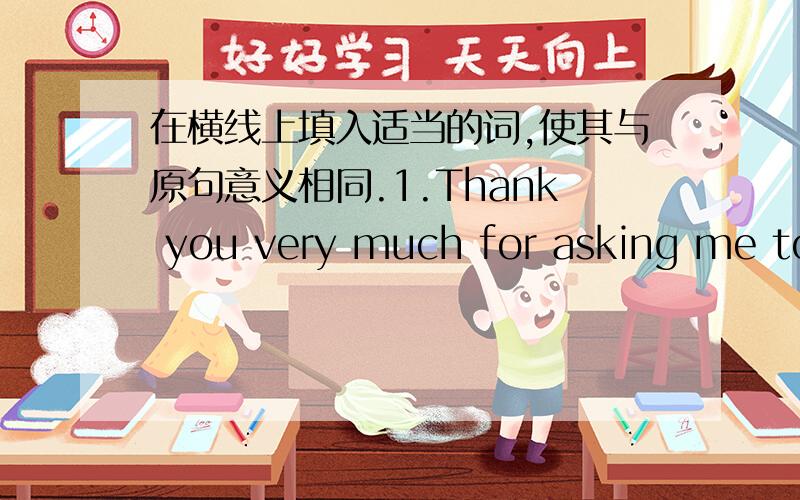在横线上填入适当的词,使其与原句意义相同.1.Thank you very much for asking me to your party.( )a lot for asking me to your party.2.I'll give her the message.I'll give the message ( )her.3.He handed her the letter.He handed the letter
来源:学生作业帮助网 编辑:作业帮 时间:2024/07/08 12:37:22

在横线上填入适当的词,使其与原句意义相同.1.Thank you very much for asking me to your party.( )a lot for asking me to your party.2.I'll give her the message.I'll give the message ( )her.3.He handed her the letter.He handed the letter
在横线上填入适当的词,使其与原句意义相同.
1.Thank you very much for asking me to your party.
( )a lot for asking me to your party.
2.I'll give her the message.
I'll give the message ( )her.
3.He handed her the letter.
He handed the letter ( )her.
4.I an here and Polly is here ,too.
I am here and ( )is Polly.
5.She is fine,and Joan is fine,too.
She is fine,and ( )is Joan.
6.He has a blue shirt,and Tom has a blue shirt,too.
He has a bue shirt,and ( )has/does Tom.
在横线上填入适当的词,使其与原句意义相同.1.Thank you very much for asking me to your party.( )a lot for asking me to your party.2.I'll give her the message.I'll give the message ( )her.3.He handed her the letter.He handed the letter
1.Thank you very much for asking me to your party.
( Thanks )a lot for asking me to your party.
2.I'll give her the message.
I'll give the message ( to )her.
3.He handed her the letter.
He handed the letter ( to )her.
4.I an here and Polly is here ,too.
I am here and ( so )is Polly.
5.She is fine,and Joan is fine,too.
She is fine,and ( so )is Joan.
6.He has a blue shirt,and Tom has a blue shirt,too.
He has a bue shirt,and (so)has/does Tom.
1.Thanks
2.to
3.to
4.so
5.so
6.so
1、Thanks
2、to
3、to
4、it
5、he
6、so